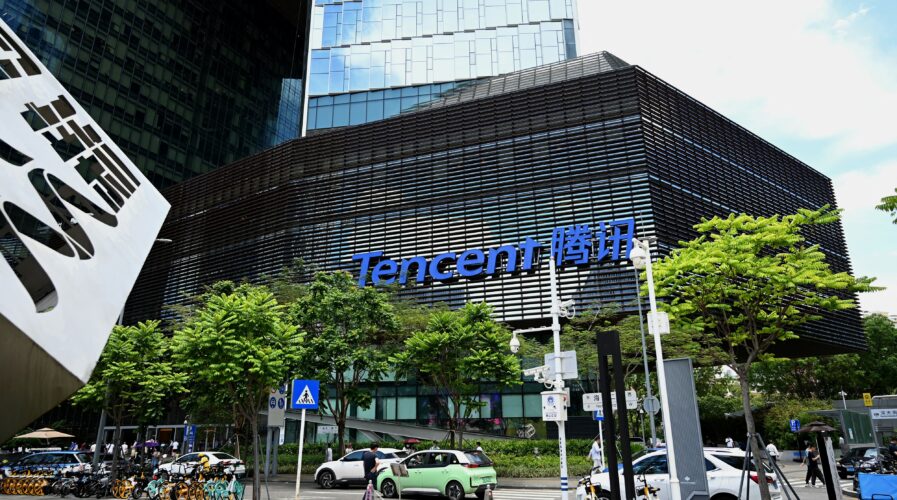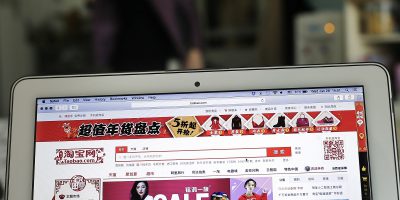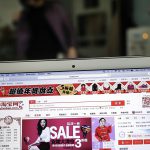
US’ ‘Notorious Markets’ list explained: Why are Chinese companies like Alibaba, Tencent in it?(Photo by NOEL CELIS / AFP)
US’ ‘Notorious Markets’ list explained: Why are Chinese companies like Alibaba, Tencent in it?
- Commerce sites operated by Alibaba and Tencent are added into US’ Notorious Markets list, as USTR claims that they have engaged in or facilitated substantial trademark counterfeiting or piracy.
- China-based online markets Baidu Wangpan, DHGate, Pinduoduo, and Alibaba’s marketplace Taobao continue to be listed.
- Other nine physical markets located within China that are known for the manufacture, distribution, and sale of counterfeit goods have also been in the list.
In February this year, the US Trade Representative (USTR) added several Chinese e-commerce sites operated by Alibaba and Tencent to the latest Notorious markets’ list. The US claimed the Chinese giants have engaged in or facilitated substantial trademark counterfeiting or piracy.
The Notorious Markets List highlights online and physical markets that reportedly engage in or facilitate substantial trademark counterfeiting or copyright piracy. The 2021 Notorious Markets List also identifies 42 online markets and 35 physical markets that are reported to engage in or facilitate substantial trademark counterfeiting or copyright piracy.
Although this was the first time that Alibaba’s cross-border e-commerce platforms AliExpress and Tencent’s WeChat were included on the list, they are definitely not the first few China-based companies to be in the Notorious Markets List. In fact, according to USTR, the list includes “42 online markets and 35 physical markets that are reported to engage in or facilitate substantial trademark counterfeiting or copyright piracy.”
China-based online markets Baidu Wangpan, DHGate, Pinduoduo, and Alibaba’s marketplace Taobao continue to be listed, as well as nine physical markets located within China that are known for the manufacture, distribution, and sale of counterfeit goods, according a statement by the USTR.
“China-based online markets Baidu Wangpan, DHGate, Pinduoduo, and Taobao continue to be listed, as well as nine physical markets located within China that are known for the manufacture, distribution, and sale of counterfeit goods,” it added.
For context, USTR first identified notorious markets in the Special 301 Report in 2006. Since February 2011, USTR has published annually the Notorious Markets List separately from the Special 301 Report, to increase public awareness and help market operators and governments prioritize intellectual property enforcement efforts that protect American businesses and their workers.
Being included on the list is a blow to the reputation of companies but carries no direct penalties. The USTR office said in a separate report that the US would need to pursue new strategies and update its domestic trade tools to deal with China’s “state-led, non-market policies and practices.”
This is considering how the US and China have been engaged in trade tensions for years over issues such as tariffs, technology and intellectual property, among others. The US even highlighted that China had failed to make good on some commitments under a so-called “Phase 1” trade agreement signed by the administration of former President Donald Trump.
China’s defense after Alibaba, Tencent were added for the first time
There is no doubt that China would not agree with the US government’s decision with its Notorious Markets List, calling the action “irresponsible”.
“We urge the US to stop politicizing economic and trade issues, and evaluate Chinese companies’ efforts and achievements in intellectual property rights (IPR) in a comprehensive, objective and fair manner,” a Chinese Foreign Ministry spokesperson Wang Wenbin said recently.
In the context of China’s effort, in 2021 alone, foreign applicants were granted 110,000 invention patents in China, a year-on-year (YoY) increase of 23%, and 194,000 trademark registrations, with a YoY increase of 5.2%. The US invention patent authorization and trademark registration in China alone increased by 32.1% and 17.3% YoY respectively.
Alibaba, after having been added into the list, said it will continue working with government agencies to address concerns about intellectual property protection across its platforms. Tencent on the other hand said it strongly disagreed with the decision and was “committed to working collaboratively to resolve this matter.”
Apart from Alibaba and Tencent, other companies in the list include Singapore’s Shopee, Indonesia’s Bukalapak and Tokopedia as well as India’s Indiamart.
READ MORE
- Ethical AI: The renewed importance of safeguarding data and customer privacy in Generative AI applications
- How Japan balances AI-driven opportunities with cybersecurity needs
- Deploying SASE: Benchmarking your approach
- Insurance everywhere all at once: the digital transformation of the APAC insurance industry
- Google parent Alphabet eyes HubSpot: A potential acquisition shaping the future of CRM


